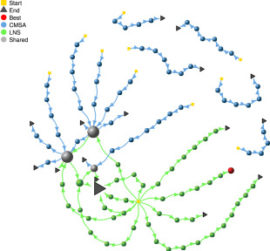- Fecha(s): 10/06/2024
- Lugar: Thinking Lab del Edificio Torretamarit (CIO) y online https://meet.google.com/mvq-bdga-nax
- Ponente: Anjeza Bekolli (Agricultural University of Tirana, Albania)

In this study, our focus is on decentralized agricultural supply chains, where multiple non-competing distributors serve the demand of their respective markets. These distributors procure a single product from a farmer through an agricultural cooperative within a specific timeframe. Agents can coordinate their actions to maximize profits, employing cooperative game theory to analyze cooperation among…

This paper applies a model in which a local market served by high-speed rail (HSR) and an airline is connected with an international market serving two different airlines. Our aim is to assess the necessity for a ban on short-haul flights from an economic policy standpoint and to investigate the potential for market self-regulation to…
- Fecha(s): 08/02/2024
- Lugar: Seminario de Métodos Cuantitativos. Universidad de Murcia
- Ponente: Volker Schoer (School of Economics and Finance, University of the Witwatersrand, Johannesburg, South Africa)

Improving the mathematics performance of school children is an objective for many policy makers around the world. It is obvious that mathematics teachers may have a key role to play in this process; however, robust examination of the teacher characteristics and practices of teachers that help to raise pupil mathematics achievement is relatively sparse, particularly…
- Fecha(s): 29/02/2024
- Lugar: Seminario de Métodos Cuantitativos. Universidad de Murcia
- Ponente: Lourdes Molera y María Semitiel (Universidad de Murcia)

We study how university economics teaching addresses sustainability. The priority of the topic has been evidenced in publications calling for a critical analysis of university programmes (Bowles, Carlin, 2020; Ansari, Landin, 2023; Prillaman, 2023). We analyse how sustainability is addressed in introductory economics courses for the degrees in Economics, Business Administration, and Law at public…
- Fecha(s): 18/01/2024
- Lugar: Seminario del Departamento de Métodos Cuantitativos de la Universidad de Murcia
- Ponente: Mariola Sánchez (Universidad de Murcia)

This paper investigates the implications of airline corporate social responsibility (CSR) uptake in the air transport industry. Then, we extend the analysis considering the impact of parallel airline alliances on CSR of airlines. The results suggest that airports play a crucial role in shaping the CSR practices of airlines and that this impact should be…
- Fecha(s): 23/11/2023
- Lugar: Seminario del Departamento de Métodos Cuantitativos. Facultad de Economía y Empresa. Campus de Espinardo. Murcia.
- Ponente: Luis A. Guardiola. Universidad de Alicante.

Abstract The coordination of actions and the allocation of profit in supply chains under decentralized control play an important role in improving the profits of retailers and suppliers in the supply chain. We focus on supply chains under decentralized control in which noncompeting retailers can order from multiple suppliers to replenish their stocks. The goal…
- Fecha(s): 25/09/2023
- Lugar: Sala Seminarios CIO (UMH). Se grabará.
- Ponente: Christian Blum, Artificial Intelligence Research Institute, IIIA-CSIC

A lot of research has been dedicated to solving combinatorial optimization problems during past decades, both in the Operations Research field and in Artificial Intelligence. As a result, researchers and/or practitioners are able to choose between a wide range of both exact and approximate techniques when faced with an optimization problem of that type. Nevertheless,…
- Fecha(s): 04/09/2023
- Lugar: Sala Seminarios CIO (UMH). Se grabará.
- Ponente: Behzad Hezarkhani, University of Southampton

The tariff rate quota (TRQ) is a common market access instrument in global agricultural trade that allows a predetermined quantity of a product to be imported at a lower tariff rate than the rate typically applied to that product. In this study, we examine the design and administration of TRQ systems from an operations management…
- Fecha(s): 27/04/2023
- Lugar: Seminario del Departamento de Fundamentos del Análisis Económico - Universidad de Murcia
- Ponente: Vicente Calabuig (Universidad de Valencia)

Abstract This paper theoretically explores the role of elites in the rise of progressive taxation in Western countries at the beginning of the XXth century and in its posterior erosion in the last four decades. We focus on its interaction with the level of inequality between the elite and the citizens. We analyse a stylized…
- Fecha(s): 18/01/2023
- Lugar: Sala Seminarios CIO (UMH). Se grabará.
- Ponente: Alejandro Saavedra-Nieves, Departamento de Estadística, Análisis Matemático y Optimización, Universidad de Santiago de Compostela

El cómputo exacto de soluciones de juegos cooperativos presenta una alta complejidad computacional cuando el número de jugadores involucrados es lo suficientemente grande. En este sentido, las metodologías de muestreo se presentan como alternativa para su aproximación en general. En esta charla revisaremos algunas de las propuestas en la literatura basadas en muestreo, así como…











